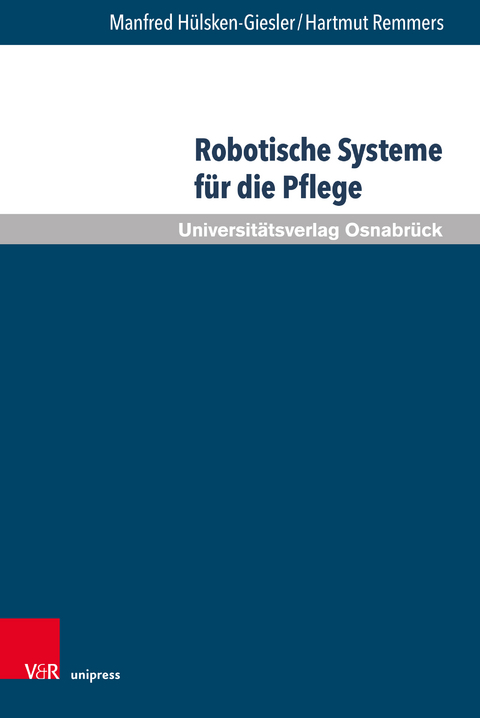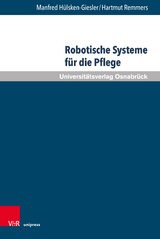Robotische Systeme für die Pflege
Potenziale und Grenzen Autonomer Assistenzsysteme aus pflegewissenschaftlicher Sicht. Unter Mitarbeit von Dominic Seefeldt, Sabine Daxberger, Anne Koppenburger und André Heitmann-Möller
Seiten
Robotik für die Pflege – pflegewissenschaftliche Argumente für den Diskurs
Die Entwicklung Autonomer Systeme in der Pflege sollte als partizipative, soziotechnische Innovation betrachtet und vorangetrieben werden. Dabei sind die Komplexität von Pflegearrangements sowie die fundamentalen Werthaltungen der Pflege zu berücksichtigen. Dieser Band zieht aus pflegewissenschaftlicher Perspektive eine kritische Bilanz der gegenwärtigen Studienlage zum Einsatz neuer Technologien, insbesondere robotischer Assistenzsysteme im Bereich der pflegerischen Versorgung und der seit drei Jahrzehnten intensiv geführten internationalen Diskussion. Einbezogen werden berufs- und leistungsrechtliche Grundlagen der Pflege sowie bereits im Vorfeld der Techniknutzung zu berücksichtigende pflegeethische Bewertungsaspekte. Autonome Systeme in der Pflege sollten primär auf die Unterstützung der Kernprozesse des pflegerischen Handelns ausgerichtet sein. Die Substitution personeller Unterstützung durch den Einsatz Autonomer Systeme ist zu vermeiden. This volume critically takes stock of the current state of studies on the use of robotic assistance systems in the field of nursing care. It takes a nursing science perspective and incorporates the intensive international discussion that has been going on for three decades while being systematically based on a differentiated understanding of the nursing profession, specific characteristics of different target groups, and a corresponding complexity of interventions. Legal issues pertaining to the nursing profession and to the systematic provision of care are addressed as well as ethical aspects of nursing care assessment. It is recommended - among other things - that the development of autonomous systems in nursing be pursued as a process of participatory, socio-technical innovation that takes into account the complexity of nursing arrangements and the fundamental values of nursing. Autonomous systems in nursing should primarily be oriented towards supporting the core processes of nursing care: defining situations and making decisions. The substitution of personal care through the use of autonomous systems should be avoided.
Die Entwicklung Autonomer Systeme in der Pflege sollte als partizipative, soziotechnische Innovation betrachtet und vorangetrieben werden. Dabei sind die Komplexität von Pflegearrangements sowie die fundamentalen Werthaltungen der Pflege zu berücksichtigen. Dieser Band zieht aus pflegewissenschaftlicher Perspektive eine kritische Bilanz der gegenwärtigen Studienlage zum Einsatz neuer Technologien, insbesondere robotischer Assistenzsysteme im Bereich der pflegerischen Versorgung und der seit drei Jahrzehnten intensiv geführten internationalen Diskussion. Einbezogen werden berufs- und leistungsrechtliche Grundlagen der Pflege sowie bereits im Vorfeld der Techniknutzung zu berücksichtigende pflegeethische Bewertungsaspekte. Autonome Systeme in der Pflege sollten primär auf die Unterstützung der Kernprozesse des pflegerischen Handelns ausgerichtet sein. Die Substitution personeller Unterstützung durch den Einsatz Autonomer Systeme ist zu vermeiden. This volume critically takes stock of the current state of studies on the use of robotic assistance systems in the field of nursing care. It takes a nursing science perspective and incorporates the intensive international discussion that has been going on for three decades while being systematically based on a differentiated understanding of the nursing profession, specific characteristics of different target groups, and a corresponding complexity of interventions. Legal issues pertaining to the nursing profession and to the systematic provision of care are addressed as well as ethical aspects of nursing care assessment. It is recommended - among other things - that the development of autonomous systems in nursing be pursued as a process of participatory, socio-technical innovation that takes into account the complexity of nursing arrangements and the fundamental values of nursing. Autonomous systems in nursing should primarily be oriented towards supporting the core processes of nursing care: defining situations and making decisions. The substitution of personal care through the use of autonomous systems should be avoided.
Prof. Dr. Manfred Hülsken-Giesler lehrt Pflegewissenschaft am Institut für Gesundheitsforschung und Bildung, Fachgebiet Pflegewissenschaft, der Universität Osnabrück.
Prof. Dr. Hartmut Remmers leitete die Abteilung Pflegewissenschaft an der Universität Osnabrück. Derzeit ist er Seniorprofessor im Institut für Gerontologie der Universität Heidelberg.
| Erscheinungsdatum | 09.08.2020 |
|---|---|
| Reihe/Serie | Pflegewissenschaft und Pflegebildung ; Band 017 |
| Zusatzinfo | mit einer Abbildung |
| Verlagsort | Göttingen |
| Sprache | deutsch |
| Maße | 160 x 235 mm |
| Gewicht | 466 g |
| Themenwelt | Pflege ► Studiengänge ► Pflegewissenschaft |
| Technik ► Medizintechnik | |
| Schlagworte | Assistenzsystem • Autonome Systeme • Ethik • Pflege • Pflegewissenschaft • Robotik • Technologie |
| ISBN-10 | 3-8471-1078-0 / 3847110780 |
| ISBN-13 | 978-3-8471-1078-1 / 9783847110781 |
| Zustand | Neuware |
| Haben Sie eine Frage zum Produkt? |
Mehr entdecken
aus dem Bereich
aus dem Bereich
Praktische Pflegeausbildung kompetent gestalten
Buch | Softcover (2021)
Urban & Fischer in Elsevier (Verlag)
42,00 €
für Lehre und Praxis an Pflege- und Gesundheitsschulen
Buch | Softcover (2024)
Urban & Fischer in Elsevier (Verlag)
40,00 €
Information, Schulung und Beratung als Aufgaben der professionellen …
Buch | Softcover (2021)
Kohlhammer (Verlag)
32,00 €




